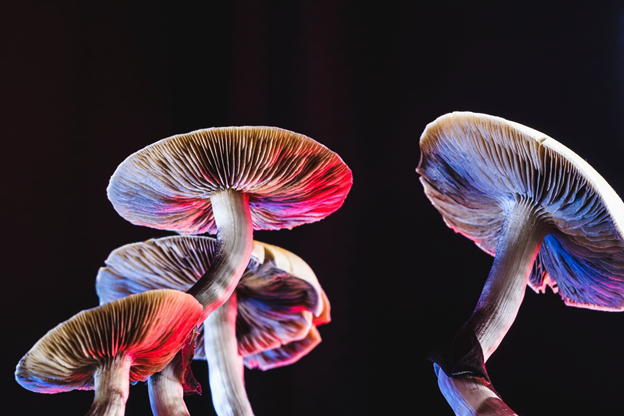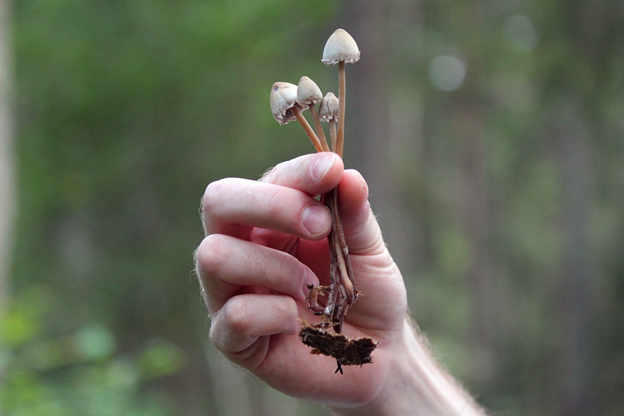Psychedelic mushrooms and mental health

Magic mushrooms, also known as psilocybin mushrooms, have been used for centuries in various cultural and spiritual contexts. Recently, these fungi have attracted the attention of the scientific community due to their potential therapeutic effects on mental health disorders. Are these mushrooms harmless and are there any risks?
Mental health is a crucial component of overall well-being, with mental disorders posing significant public health challenges worldwide. Common issues such as depression, anxiety, and PTSD affect millions, leading to severe personal and societal consequences. Depression is one of the most prevalent mental disorders and it often remains undiagnosed, anxiety disorders are followed by persistent fear and worry, and they can also severely disrupt daily functioning. PTSD is particularly prevalent among individuals who have experienced traumatic events, leading to serious emotional and physical issues.
Despite various available treatments, including medications and psychotherapy, many patients do not respond adequately, highlighting the urgent need for new and innovative therapeutic approaches. Magic mushrooms and their active ingredient psilocybin offer a promising alternative, supported by increasing scientific evidence, but further research is essential to ensure their safe and effective clinical application.
Historical use of psychedelics in treating mental illness
Psychedelics, including magic mushrooms, have a long history of use in various cultures for healing and spiritual purposes. Indigenous peoples in Central and South America have used psilocybin mushrooms in religious ceremonies for centuries, believing in their power to connect with the divine and heal the soul. In the mid-20th century, the therapeutic potential of psychedelics began to be explored scientifically. Early studies in the 1950s and 1960s showed promise in using LSD and psilocybin to treat mental health conditions such as depression, anxiety, and addiction. These substances were found to facilitate profound psychological insights. In 1958, Swiss chemist Albert Hofmann and co-workers isolated psilocybin and smaller amounts of psilocin from the mushroom P. mexicana.
However, the political and social backlash of the 1970s led to the criminalization of psychedelics, halting research for several decades. Recently, there has been a resurgence of interest in psychedelic therapy, with contemporary studies confirming the benefits observed in earlier research. Psilocybin, in particular, has gained recognition for its ability to induce lasting positive changes in mood and cognition, prompting renewed investigation into its clinical applications.
How psilocybin works in the brain?
Psilocybin, the active compound in magic mushrooms, works by binding to serotonin receptors in the brain, particularly the 5-HT2A receptor. Once ingested, psilocybin converts to psilocin, which increases serotonin activity, influencing mood, perception, and cognition. This leads to altered perceptions, emotional release, and a sense of interconnectedness. Psilocybin promotes neuroplasticity, helping the brain form new neural connections, and reduces activity in the default mode network (DMN), which is linked to self-referential thoughts and rigid thinking patterns. By enhancing overall brain connectivity, psilocybin enables more flexible thinking and new perspectives. These effects have significant therapeutic potential, including alleviating depression symptoms, reducing anxiety, and facilitating emotional breakthroughs.

Therapeutic potential of psychedelics
Psychedelics hold significant promise in the treatment of various mental health conditions. Research has shown that microdosing in healthy individuals can have positive effects on personality traits and yield promising results. It suggests that these substances can catalyze profound therapeutic experiences, leading to lasting positive changes in mood, cognition, and behavior. They have shown particular efficacy in treating depression, anxiety, PTSD, and addiction, often providing relief where traditional treatments have fallen short. Magic mushrooms also helped getting over fear of death.
Additionally, psychedelics have the potential to facilitate transformative experiences that promote personal growth, self-discovery, and spiritual insight. These findings have sparked a renewed interest in psychedelic-assisted therapy, with ongoing research aiming to harness their therapeutic potential for the betterment of mental health care. But…
Is there any risks associated with psychedelic use?
While psychedelics like psilocybin offer therapeutic potential, their use also carries inherent risks that must be carefully considered. One of the primary concerns is the potential for adverse psychological reactions, commonly referred to as “bad trips.” These experiences can include intense fear, paranoia, and confusion, which may lead to distress or harm if not managed properly. Additionally, psychedelics can exacerbate underlying mental health conditions in vulnerable individuals, particularly those with a history of psychosis or mood disorders.
Another risk is the potential for unpredictable behavior while under the influence, which may result in accidents or self-harm. Furthermore, the legal and regulatory status of psychedelics presents challenges for safe and controlled use outside of clinical settings. Proper screening, preparation, and supervision are essential to mitigate these risks and ensure the safe administration of psychedelics in therapeutic contexts. What’s happening next?
Current research and clinical trials
In recent years, there has been a resurgence of interest in psychedelics, leading to an increase in research and clinical trials exploring their therapeutic potential. Universities, research institutions, and private organizations around the world are conducting studies to better understand the effects of psychedelics on mental health and to develop novel treatment approaches. Clinical trials investigating the use of psychedelics, including psilocybin, MDMA, and LSD, are being conducted for various mental health conditions, such as depression, anxiety, PTSD, and substance use disorders.
These studies involve administering psychedelics in a controlled setting under the supervision of trained professionals, such as psychiatrists, psychologists, and therapists. Participants undergo thorough screening to ensure their safety and suitability for the study. During the sessions, participants receive psychological support and guidance to help navigate the psychedelic experience and integrate any insights gained into their lives afterward.
Preliminary findings from these studies have shown promising results, with many participants reporting significant improvements in their symptoms and overall well-being following psychedelic-assisted therapy. However, further research is needed to fully understand the mechanisms of action, optimal dosing protocols, and long-term effects of psychedelics on mental health.
The growing body of evidence supporting the therapeutic benefits of psychedelics has led to increased interest from regulators, policymakers, and the general public. As research progresses, there is hope that psychedelics may become an important tool in the treatment of mental health disorders, offering new hope to those who have not responded to traditional therapies.
Legislation
Although the trend of psilocybin treatment is growing, the legislation varies from country to country. As of 2024, some psychedelics have been given a legal or decriminalised foothold in parts of Central Africa, South Africa, Australia, the Bahamas, Brazil, the British Virgin Islands, Canada, the Czech Republic, Costa Rica, Israel, Jamaica, Mexico, Nepal, the Netherlands, Panama, Peru, Portugal, Samoa, Spain, Switzerland and the United States. In other countries pschedelics are either illegal or not subject to the legislature.
When it comes to legislation and psychedelics, it’s usually spoken about legalization of cannabis. The careful regulation and legalization of cannabis or psilocybin for medical purposes would ensure safe and effective treatment options for patients. Adhering to international conventions and implementing rigorous national laws help to prevent abuse, control quality, and ensure that supstance is used responsibly and effectively. The legal framework would support medical research, ensure patient safety, and allow for the medical benefits to be utilized in a controlled and safe manner.
Magic mushrooms, particularly their active ingredient psilocybin, have significant potential for treating various mental disorders. The therapeutic potential is supported by an increasing body of scientific evidence, highlighting benefits for depression, anxiety, and PTSD. However, safety aspects and the need for further research are crucial. As society advances towards a more nuanced understanding of psychoactive substances, it is important to balance therapeutic possibilities with responsible use and rigorous scientific validation.
As we delve into the therapeutic potential of magic mushrooms, the full scope of their impact on mental health treatment and societal norms remains uncertain, leaving the answers to these questions to unfold in the future.